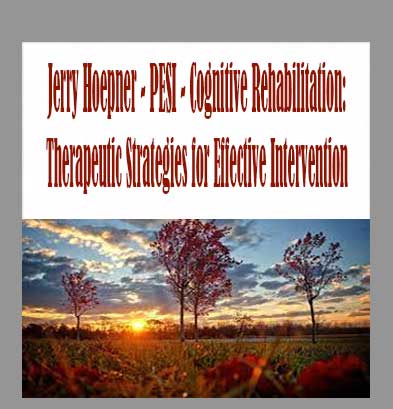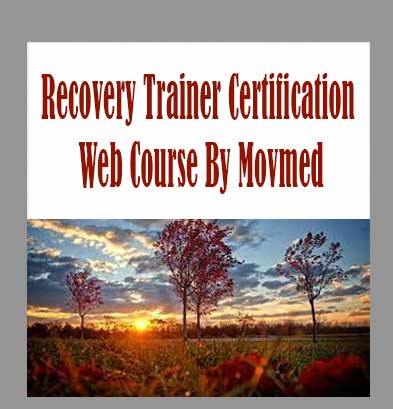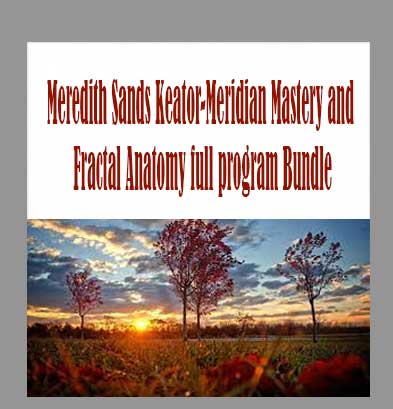Description
Jerry Hoepner – PESI – Cognitive Rehabilitation: Therapeutic Strategies for Effective Intervention download, Jerry Hoepner – PESI – Cognitive Rehabilitation: Therapeutic Strategies for Effective Intervention review, Jerry Hoepner – PESI – Cognitive Rehabilitation: Therapeutic Strategies for Effective Intervention free
Jerry Hoepner – PESI – Cognitive Rehabilitation: Therapeutic Strategies for Effective Intervention
The rehabilitation of cognitive impairments is becoming more and more complicated. Patients in your care are presenting with complex, multi-faceted cognitive deficits, and at best you have 48 minutes, five days per week to understand and improve upon their cognition. Keeping up with the ever-changing evidence on assessment and interventions for acquired cognitive disorders can feel daunting. Your previous learning in graduate training programs may already be obsolete. Furthermore, you are now better equipped to apply knowledge to the clinical context. We will revisit applications of anatomy and physiology to everyday practice, affirm relevance of current-effective clinical practices, and adapt new practices supported by contemporary evidence. Join Jerry Hoepner, PhD, CCC-SLP, and gain a clear understanding of the functional manifestations of cognitive impairments, organize cognition into a manageable paradigm, and establish functional goals to guide your effective therapy.
- Cognitive-Linguistic Assessment Tools
- Documentation for Reimbursement
- Attention
- Memory
- Executive Function Skills
- Visual Perceptual Function
- Delirium, Depression and Right Hemisphere Dysfunction
Drawing on over 15 years of clinical experience and more than 10 years of teaching, Dr. Hoepner will teach you skills to appropriately create a plan of care and realistically facilitate improved function in your patients. Attend this information-packed seminar and systematically understand the anatomy of each component of the cognitive-communication system and move quickly into specific management techniques for intervention. Walk away with practical and useful techniques which can be implemented immediately within your practice. Through examples from experience and case studies, Dr. Hoepner will go beyond lecturing and facilitate learning through a collaborative exchange of ideas relating to therapy techniques.
Speaker
Jerry K Hoepner, PhD, CCC-SLP
Jerry Hoepner, PhD, CCC-SLP, is an assistant professor in the Communication Sciences and Disorders Department at the University of Wisconsin – Eau Claire. In that capacity, he teaches coursework in neuroanatomy, dysphagia, aphasia, acquired cognitive disorders, and counseling. Dr. Hoepner received his MS from the University of Wisconsin – Eau Claire and his PhD from the University of Wisconsin – Madison in Communication Sciences and Disorders. His current research examines the role of partners in supporting the success of everyday interactions of individuals with traumatic brain injury, aphasia and dementias. A second line of research examines teaching pedagogies and learner responses. Clinically, Dr. Hoepner specializes in the use of routines to reduce demands on working memory and executive functions. He co-facilitates Aphasia Camp and the Chippewa Valley Aphasia Group.
Speaker Disclosures:
Financial: Dr. Jerry Hoepner is an assistant professor and researcher at the University of Wisconsin Eau Claire. He receives a speaking honorarium from PESI, Inc. He has no relevant financial relationships with ineligible organizations.
Non-financial: Dr. Jerry Hoepner is on the board of directors for the Chippewa Valley Aphasia Group.
Target Audience
Counselors, Nurses, Occupational Therapists & Occupational Therapy Assistants, Physical Therapists/Physical Therapist Assistants, Social Workers, Speech-Language Pathologists, and other Mental Health Professionals
Objectives
- Articulate the six types of attention and their connection to cognitive-linguistic impairments.
- Connect behavioral manifestations with specific cognitive and/or linguistic disorders.
- Analyze appropriate tools for the assessment of attention, memory function and visuospatial function.
- Characterize the attributes of executive functions and explain their connection to other cognitive processes.
- Formulate functional short-term and long-term patient goals for the remediation of cognitive-linguistic impairments.
- Distinguish impairments to the arousal, attention, and awareness continuum across etiologies (right hemisphere damage vs. dementias and traumatic brain injury).
- Integrate the appropriate therapy tasks, exercises and games in patient treatment programs.
Outline
Cognitive-Linguistic Assessments
- Screening tools
- Cognitive evaluations (standardized and non-standardized)
- Language assessments (standardized and non-standardized as they apply to cognitive assessments)
- Rating scales (provider and consumer)
Cognitive Rehabilitation Techniques
- Remediation / Compensation / Adaptation
- Therapy decision-making (dynamic/ongoing assessment; patient centered; goal directed)
Documentation of Skilled Services
- Justification for skilled, necessary and reasonable therapy
- ICD-9 / ICD-10 codes pertinent to SLP intervention
- SMART goals
- Outcome measures
- FIMS
- NOMS
- Relevancy to G-Codes
- A guide for developing LTG’s
- Key elements required for:
- Daily notes
- Progress notes
Attention
- Posner’s Theory of Attention
- Anatomic substrates of the attention system
- Attention subtypes
- Functional manifestations of inattention
- Interventions strategies for promoting improved attention across recovery continuum
- Remediation
- Wakefulness (stimulation management programs)
- Reduced agitation (validation therapy, environmental modification, positive psychology)
- Increased function (direct attention training with reflection)
- Compensatory strategies (partner-based supports, environmental interventions)
- Adaptation techniques (assisted prompting)
- Remediation
- Goal writing for attention deficits
Memory
- Anatomy of the memory systems
- Memory types
- Encoding / Consolidation / Retrieval
- Interventions for facilitating recall
- Remediation
- Utilization of preserved systems (spaced retrieval, routines, implicit learning)
- Adaptation techniques
- External aids
- Task-specific learning
- Goal writing for attention deficits
- Remediation
Executive Functions (EF)
- Anatomic substrates of the EF system
- McCloskey’s Executive Functions
- Executive functioning hierarchy
- Self-activation
- Self-regulation
- Self-realization
- Self-determination
- Functional manifestations of EF impairments
- Specific focus areas for EF’s
- Functional problem solving
- Awareness / Insight
- Strategies for reducing the effects of executive dysfunction
- Remediation (Reflection, video self-modeling, Ylvisaker’s Goal-Plan-Do-Review)
- Compensation (routines, environmental interventions, partner-based interventions)
- Adaptation (cognitive prosthetics)
- Goal writing for EF and problem solving
Visual Perceptual Function
- Anatomy of the visual system
- Warren’s Visual Perceptual Hierarchy
- Functional manifestation of visual perception deficits
- Therapeutic strategies specific to:
- Low vision
- Hemispatial neglect
- Remediation (known quantities, metacognitive/self-regulatory interventions)
- Compensation (environmental interventions, partner-based interventions, edgeness and bookness)
- Adaptation (visual/attentional prosthetics)
- Goal writing for visual perceptual impairments
Special Considerations
- Delirium
- DSM-5® criteria for delirium
- The neuroscience of delirium
- Diagnosing delirium
- Protective, predisposing and precipitating factors for delirium
- Reversible causes for delirium
- Treatment techniques for delirium
- Depression
- Clinical manifestations of geriatric depression
- Medications which can cause depression
- SLP role in the management of depression
- Right Hemisphere Dysfunction (RHD)
- Assessment tools specific to RHD
- Clinical manifestations of RHD
- Left hemispatial neglect
- Pragmatic impairment
- Reduced awareness / insight
- Cognitive impairment
Specific Therapy Activities
Case Studies
Frequently Asked Questions:
- Innovative Business Model:
- Embrace the reality of a genuine business! Our approach involves forming a group buy, where we collectively share the costs among members. Using these funds, we purchase sought-after courses from sale pages and make them accessible to individuals facing financial constraints. Despite potential reservations from the authors, our customers appreciate the affordability and accessibility we provide.
- The Legal Landscape: Yes and No:
- The legality of our operations falls into a gray area. While we lack explicit approval from the course authors for resale, there’s a technicality at play. When procuring the course, the author didn’t specify any restrictions on resale. This legal nuance presents both an opportunity for us and a boon for those seeking budget-friendly access.
- Quality Assurance: Unveiling the Real Deal:
- Delving into the heart of the matter – quality. Acquiring the course directly from the sale page ensures that all documents and materials are identical to those obtained through conventional means. However, our differentiator lies in going beyond personal study; we take an extra step by reselling. It’s important to note that we are not the official course providers, meaning certain premium services aren’t included in our package:
- No coaching calls or scheduled sessions with the author.
- No access to the author’s private Facebook group or web portal.
- No entry to the author’s exclusive membership forum.
- No direct email support from the author or their team.
We operate independently, aiming to bridge the affordability gap without the additional services offered by official course channels. Your understanding of our unique approach is greatly appreciated.
- Delving into the heart of the matter – quality. Acquiring the course directly from the sale page ensures that all documents and materials are identical to those obtained through conventional means. However, our differentiator lies in going beyond personal study; we take an extra step by reselling. It’s important to note that we are not the official course providers, meaning certain premium services aren’t included in our package:
Refund is acceptable:
- Firstly, item is not as explained
- Secondly, Item do not work the way it should.
- Thirdly, and most importantly, support extension can not be used.
Thank you for choosing us! We’re so happy that you feel comfortable enough with us to forward your business here.







Reviews
There are no reviews yet.